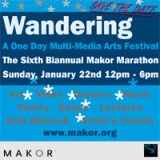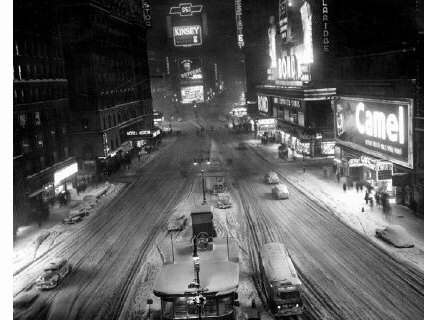Harlem is sliding by, outside the dirty windows, and to Tristan it glows hot with mystery.
Block after block of artful brownstone, snatches of noise and melody, shadowed liquid silouhettes. Albert is tapping his hands against the flat top of the drumcase on his lap, reprising some rhythm of old.
"So can you dance?" he asks.
"No," Tristan says, "but I can eat." The cab pulls up in front of a four story building on a leafy, residential street, a block down from the bright commercial strip. The third floor windows are a shadow-theater of backlit bodies, and as he steps from the cab Tristan can already hear a thump piano and the clamor of conversation.
Between the two of them, he and Albert manage to haul the trap set up the bald-carpeted stairs. A man with shoulder muscles Tristan figures must earn him his living greets them at the top of the third landing. The sleeves of his white crewneck are pushed to the elbows, and one of his leather suspender-straps keeps slipping down his arm. He holds a floppy newsboy hat in one hand, a waxpaper cup swishing with some kind of liquor in the other. "Al Van!" he says, draining the cup and donning the hat. "Our prayers have been answered!" He relieves Albert of his burdens and leads the way inside.
Tristan follows, lugging the snare and the cymbal bag, and finds himself in a small living room dense with people. An L-shaped sofa beneath the front windows is crammed tight with couples leaning forward to talk over the notes and voices. Two tired-looking women, one old and one young, bookend the couch, fanning themselves against the rising heat of all these bodies. The old woman uses her hat, the young one her hand.
Plates, drinks, and the ghosts of drinks litter the coffeetable, and everything jumps when the portly, sweatsoaked man sitting at the piano by the opposite wall, a personal cemetery of crushed paper cups and empty plates around his own feet, digs in and starts swinging fast and loose and the dancing picks up. Young men in their shirtsleeves stand close to women whether dancing or just talking, and everyone is smiling and drinking and half-hearing one another. Gumbo and bottled beer and cayenne pepper and fried chicken and whiskey and gin and perfume and cologne and sweat and almond cake and cigarette smoke funky up the hot air but the smell is good.
A big woman is jitterbugging to the music as Tristan struggles through the room, toward the alcove where Albert is unpacking the drums. "Uh oh," and "watch out now," people exclaim, stepping back as much as they can to make room as the heavy woman and the pianist lock eyes and grin and he ratchets the tempo skyward. Tristan has never seen so large a woman move so well. There are plenty of them in his neighborhood, his mother being one, but they all walk arthritically and act a hundred years old, and he can't picture any one of them dancing.
Tristan maintains a muttered stream of excuse mes as he walks, but after the first few fellows hear him an awareness ripples through the crowd and folks clear a path, smiling and nodding and lifting their drinks as he passes, saying "right this way" and "all right, now." Tristan grins back, conscious of his otherness but feeling oddly welcome. This is not like being a Semetic neanderthal on glamour-and-glitz 52nd Street. There is something in this atmosphere that Tristan recognizes: knows or imagines he does. Below the fear and excitement of being here -- alone, alive, half-drunk, useful, unique -- at this decadent, roiling Harlem jubilee, there lies, in the pit of Tristan's stomach, an unprovable suspicion that these people are like him, and that he loves them.
Not that blacks are like Jews -- although this cramped apartment, these big women, all this food, suggest that is a part of it. What Tristan feels is stranger and more intimate. He cannot get any closer to it than that. Not now anyway, because Albert is taking the drums from him, setting them down, showing Tristan how to undo the taut nylon cords. As he fumbles at the task, the feeling of fellowship takes on another dimension: it makes his awkwardness that much harder to bear.
"Tristan," says the drummer, "meet Charles, our host. Charles, Tristan." Albert winks. "My valet."
"Pleased to meet you." The man who let them in pumps Tristan's hand. "I'll set 'em up if you please, Al. You know I know how. You fellows go grab yourselves a plate and a drink."
"Don't forget a woman," says Albert, and spins off toward the bright-lit kitchen. Tristan stays where he is, hunched over the equipment, hoping he can continue to look useful for a moment longer.
"You a musician too?" Charles asks over his shoulder, unfolding the tripod legs of Albert’s cymbal stand.
"No," Tristan says, apologetic. "You?"
"I fool around a little on guitar." Charles clamps the snare into place. "Not in front of guys like Al and Lester, though. They'd put me right to shame. So how long you been knowing Albert?"
"We just met tonight."
"That so?" Charles laughs. "And he convinced you to haul these drums up here for him, did he? Well, that's Albert. Now you know." Charles takes a backward glance at Tristan, and although it is quick, Tristan has the unmistakeable sense he’s been sized up. "You look a little edgy," Charles says, as if it is no big deal, the kind of thing he might notice in any of his guests. Tristan is grateful for his nonchalance, at least. "You make it Uptown much?"
"Well, I live in the Bronx," says Tristan, and wants to slap himself in the head. It's a doltish answer, a damn non-sequitor, and even worse perhaps Charles will construe it to mean not Yes, I have to pass through here to get home but I'm Jewish, so of course I never come to Harlem.
Charles looks at Tristan and then speeds his talk and returns to the work. "Right. Well, you never know who's gonna show up round here. My wife and I been throwing these shindigs for five years, and I've had folks from all over. Wouldn't surprise me none if I looked up and seen Joe Stalin standing in my living room, holding a plate of pigs' feet and doing the shake with Miz Clarke." He points at the big woman with his chin, then shoots Tristan a smile that seems intended to put him at ease and, thus, doesn't.
"What line of work you in, Charles?" Tristan blurts. What does one ask an adult? The grown-up folks in Tristan's life have always been his parents' friends and his teachers, and conversations with both proceed inside close parameters, governed by codes as firm and clear as Jewish dietary law. But Tristan is an adult himself now, a college man, and this is a question he knows he has heard his father ask.
"I'm a schoolteacher," Charles says, and Tristan resents those bulging deltoids for lying to him, then resents Charles for having the physique he does as anything other than the result of backbreaking labor. Finally, Tristan resents himself, for assuming that Charles earns his paycheck bodily. Because he's black? No -- because everyone Tristan knows except schoolteachers is a pushcart peddler, a bolt cutter, a dressmaker, a factory hand. He's not assuming anything he wouldn't assume anyway, anything that isn't true of his own father.
"What do you teach?"
"Math and science, at the high school over on 145th. And you? What's your field?" Tristan feels like Charles is smirking on the inside as he asks the question, the way an adult does while in the midst of a psuedo-serious discussion with an earnest toddler. To a teacher, Tristan probably looks his age.
"I go to City College." A pause, and he summons up the courage to say, "I'd like to be a writer."
Charles seems to notice the new light in his companion's eyes. "Good for you," he says, and claps Tristan on the back. "We need more wordsmiths in this world. You know who was up here last month? Langston Hughes. I know you've read some Langston. No? And you're a writer? Man, before you leave remind me to show you one of his books."
"Alright." Tristan bobs his head and smiles. The drums are ready to be played.
"None of my business," says Charles, "but you look young to be a college man. You skip some grades?"
Tristan eyes the floor. "I'm fifteen."
"That right? I don't think we've ever sent one off that young. Man. I might have the next Langston standing right here in my living room."
Tristan shrugs, then drops his shoulders hard. "Everyone skipped ahead at my school. As soon as you could read and write and do a little math, off you went."
"Hey, now," Charles says, "don't kid a kidder, now. Fifteen and in college, that's a real achievement. I bet your parents are mighty proud, aren't they?"
Tristan shrugs again. "I think I'll get something to eat.”
"Sure," Charles agrees, waving him toward the kitchen. "Go on in and fix yourself a plate. Don't be shy. Have a drink, too. No Bob Crosbys in this house, as Les would say."
The kitchen is tiny and yellow and full of people, mostly women. The window is open to the fire escape, where three men in suits are standing and passing something back and forth, and the room is cooler by far than the other. In the center of it is a card table just like the Brodskys', every inch covered with serving trays and pots, ladles and tongs. Albert strolls over from across the room, where he’s been leaning up against the counter, ankles crossed, chatting up two middle-aged women. He corrals Tristan and walks him through the menu as if his charge has never eaten before. Soon Tristan’s plate is buckling beneath the weight of all the chicken, macaroni and cheese, heavy-dressed salad, buttered corn, and string beans Lonnie has piled on "for starters." The women watch the whole thing, shaking their heads as the heap of food grows bigger.
"Now honey, you ain't got to eat all that," one of them assures Tristan when Albert finally hands the plate over.
"But if you don't," warns Albert, "no dessert." The four of them laugh and then Albert snaps his fingers and takes Tristan's elbow. "I got somebody I want you to meet," he says, lifing the plate from Tristan's hands and setting it down atop the stove.
"You better let that child eat," one of the ladies protests.
"Got to work up an appetite first," Albert calls over his shoulder, leading Tristan down the dark hall which connects the kitchen to the rest of the apartment. "Down here is the card game," he explains as they near a doorway, but Tristan doesn't need to be told. Gambling sounds the same in Harlem as it does in the Bronx.

The air above the table is blue-grey with smoke. Three of the five players grip plump cigars with their teeth; the other two hold cigarettes. On couches in the dim recesses of the room sit others, studying the game and waiting for a shot at the action. On a chair in the far corner sits a placid girl who could be Tristan's age. No one looks up from the table for longer than a second when Albert and Tristan enter.
"Dolores," the drummer says, beckoning, "come here a second, sugar." The girl walks over to them, and Albert puts an arm around her thin shoulders. She is every inch the schoolgirl: small, with big clear-brown cat-eyes and obedient hair tied back into a ponytail that just brushes the high collar of a blue cotton blouse. "Hey, Dee," Albert greets her, then raises his voice to address the room. "Last call for food and drink, gents. Dolores's going on a little break."
"Thank you for taking such good care of us, honey," says one man, bending across the table to hand her a folded bill. Dolores smiles for an instant, and slides it in her skirt pocket. "You know Dee's my lucky charm," he tells the others. "if I was smart I'd cash out the second she leaves the room."
"But you ain't smart, Earl," calls somebody from a couch.
"Damn right I'm not," roars Earl. "Sling the cards, Doc, sling the goddamn cards."
Albert shuts the door behind them. "Tristan, meet Dolores. I figured the two of you might like some company your own age."
Dolores flicks her eyes at Tristan and then crinkles her forehead at the drummer. "How old is he?"
"Don't ask me, girl, ask him," Albert says. He struts off toward the kitchen, leaving them alone.
Dolores looks at Tristan with a mixture of impatience and resignment. It is the look his cousin Gerty used to give him when she came to babysit, and the thought occurs to Tristan that perhaps Dolores didn't want to be rescued from the dismal, smoky card room at all; probably she’s annoyed with Albert for yanking her away from paying work and indenturing her into conversation with some gangly Heeb.



A Parable after my hard drive crashed
Zalman Schachter-Shalomi
Christmas in Jerusalem
Jay Michaelson
Carobs
Elisha Porat
Dear Mr. Pinter
Dan Friedman
The Nuclear Physicist Gives his Son a Haircut
Hanan Harchol
Brodsky Begins, Part Two
Adam Mansbach
Archive
Our 870 Back Pages
Zeek in Print
Subscribe now!

About Zeek
Mailing List
Contact Us
Subscribe
Tech Support
Links

From previous issues:
Tribal Lessons
Retrato de Familia
Beyond Belief
Michael Shurkin
Bara Sapir
Joshua Furst
